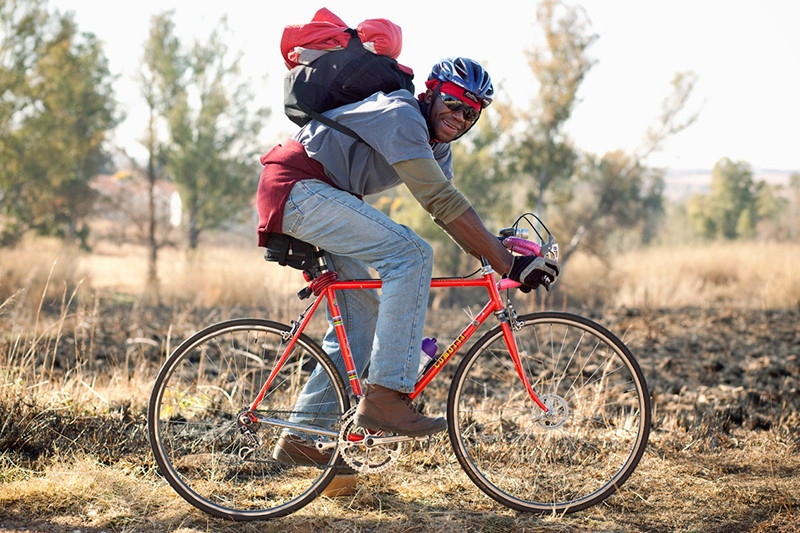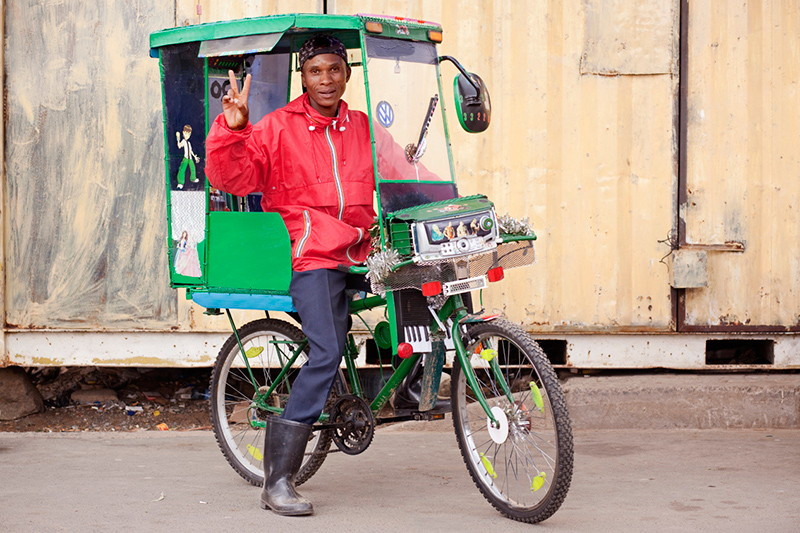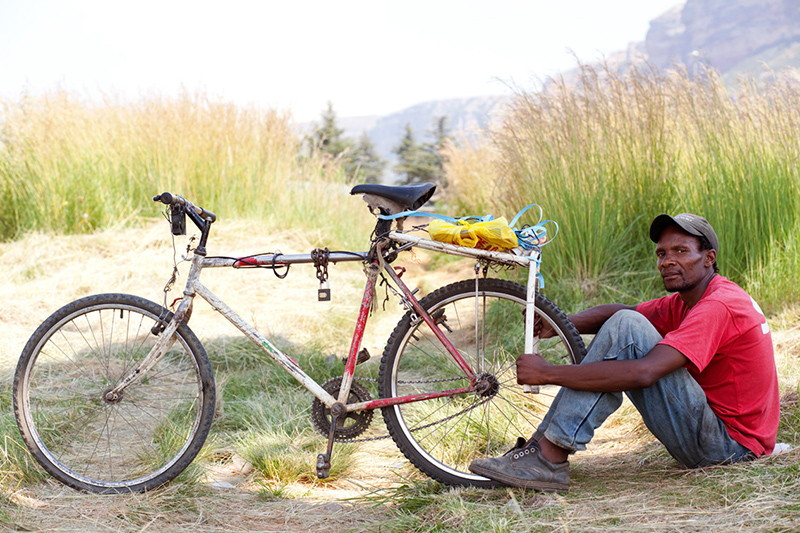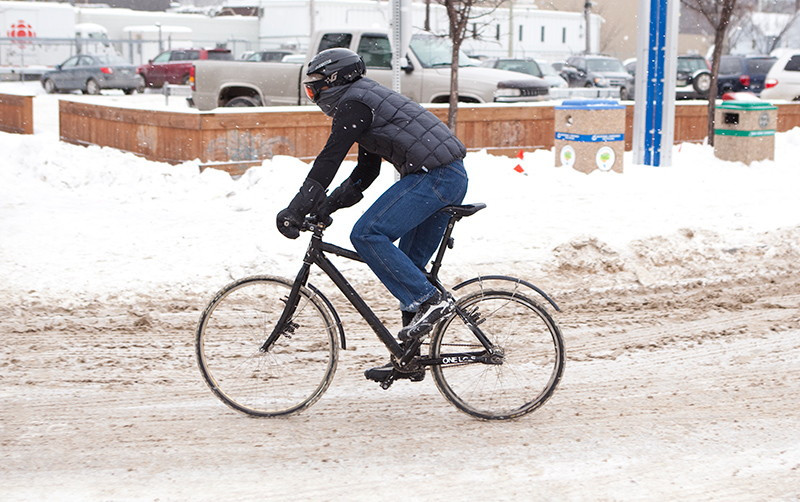South African photo project documents unique cycling culture
Winnipeggers find common ground through two-wheeled tribulations
When Stan Engelbrecht and Nic Grobler decided to set off on a journey across their native South Africa through 2010 and 2011 to document the nation’s commuter bike culture, they knew they were in search of something elusive.
“If you’re on the outside looking in, there is no commuter culture (of cyclists) here,” says Engelbrecht, who works in the publishing industry, via Skype from Cape Town.
“It just doesn’t exist.”
Both avid cyclists, the pair of friends pedaled more than 5,000 kilometres throughout the country broken up over the course of two years, interviewing and photographing more than 500 daily bike users along the way as part of their Bicycle Portraits photo-book project.
Far from uncovering a cohesive two-wheeled culture on their travels, the two played witness to a scattered demographic largely defined by its sense of quirky individualism.
“Often in these communities you’ll find that people who commute by bike are eccentrics,” explains Engelbrecht, noting many rural villages have only a few cyclists, if any.
“They’re people who are seen as being a bit strange for doing what they do.”
While bike usage in the country has seen an increase in recent years - particularly among white, urban, affluent young people newly concerned with environmental interests - diehard bike commuters have always numbered in the very few in spite of unreliable and often unsafe public transit systems, according to Engelbrecht.
“There’s a real cultural stigma attached to riding a bike here,” he says, noting that some poorer, more traditional communities in particular are averse to the idea of women cycling.
“It’s very sad, because these are some of the people that could benefit the most from having bicycles in their lives.”
The country’s long history of racial discrimination contributes further to the problem.
Since the end of apartheid, many members of poorer black communities have rejected the bicycle as an outward symbol of poverty, Engelbrecht says. Instead, they aspire to own cars, despite often being unable to afford them.
These factors, paired with poor infrastructure, an oft-hostile road culture in terms of motorists’ behavior toward cyclists and little access to good-quality bikes, contribute to a cycling environment that’s far from ideal.
On the plus side, that means just about anyone crazy enough to get on two wheels is bound to be interesting.
Engelbrecht encountered a cyclist who constructed his elaborate, semi-enclosed rig from scrap material after seeing it in a dream, a former marathon champ who continues to ride despite his permanently injured leg, and countless other characters whose stories range from the hilarious to the heartbreaking.
“We met some really amazing people,” he says.
Since completing the Kickstarter-funded project, which was published simultaneously as three bound volumes last year, the pair has visited each of the 162 subjects whose stories and portraits were included in the collection and given them a copy of the book as thanks.
“That’s part of what we want to do: introduce these people to one another and show them there are others who share some of their experiences.”
Shared experiences
Speaking of shared experiences, phrases such as “unfriendly road culture,” “poor infrastructure” and “sub-par transit” are sure to remind Winnipeggers of their own cycling situation.
Pat Krawec, executive director of the Winnipeg Repair Education and Cycling Hub (WRENCH) on Logan Avenue, doesn’t complain about any of the above.
However, he agrees the two cultures share some deeper issues.
“We’ve got pockets of the third world right in our own city,” says Krawec, pointing out how Winnipeg, like South Africa, continues to experience the effects of a legacy of racially xenophobic public policy.
Like Engelbrecht and Grobler, Krawec sees the bicycle as a potential tool for positive social change.
“It’s a human technology,” he says. “For a lot of people, bikes are associated with freedom in general.”
As a registered charity, the WRENCH’s mandate is to provide the community a range of programming, education and resources (geared towards bike construction, repair and safety).
For Krawec, however, it’s the human connection the initiative facilitates that matters most.
“The biggest impact we hope to have is in building healthy communities,” he says.
“(At the WRENCH) you’ll see people from the poorer neighbourhoods working together with people from more affluent neighbourhoods, and vice-versa - and I think that’s something we really need more of.”
Although she currently lives in Vancouver where she works as a bike mechanic, Winnipeg-born Brenna Coupland has experienced both cycling cultures first-hand.
In addition to biking across much of Western Canada, Coupland spent the better part of 2011 pedaling around various parts of Africa (including one month in South Africa), raising awareness and soliciting donations for a Ugandan charity that assists HIV-positive women in the impoverished country.
When she returns to the continent later this year, Coupland intends to directly address one of the problems Bicycle Portraits highlights - women’s lack of accessibility to cycling - by staging mobile workshops with a focus on teaching women how to repair bikes.
“I can’t wait to go back,” she says.
While Coupland says commuter bike cultures vary across the African countries she visited (she says Kenya and Malawi, among other nations, bustle with casual cyclists), her assessment of Winnipeg aligns with expectations.
“I hear a lot of complaints about Winnipeg as a bike city from friends who live there,” she says, although she admits things seem to be slowly improving.
“When I’m there, I’m definitely more nervous to bike on the streets.”
To purchase your own copy of Bicycle Portraits or view some of the photos for free, visit www.dayonepublications.com/Bicycle_Portraits
Published in Volume 67, Number 18 of The Uniter (January 30, 2013)










